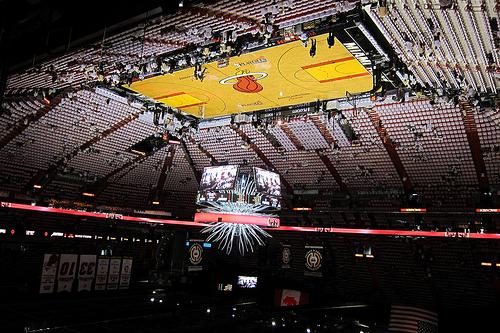By Katie Tegtmeier (Contributor) – Email
Print Edition: July 4, 2012
For the Oklahoma City Thunder (OKC) and the Miami Heat, the Finals came to a close as forcefully as they began. During their quest for the trophy, the only team that seemed to give OKC a run for their money was the San Antonio Spurs; the LA Lakers and the Dallas Mavericks were demolished before each series reached a sixth game. Miami faced a slightly harder time approaching the Finals: despite easily defeating the New York Knicks first round, the Indiana Pacers and Boston Celtics ensured Miami’s ride to the Final was a bumpy one. When OKC and Miami met in the Finals, the tension was high. For OKC, their leading players—Kevin Durant, Russell Westbrook and James Harden—were all under the age of 24. Given the level of experience on the Heat, the match-up was an intimidating one. For Miami, tension was high entering the Finals because their leading core—Dwayne Wade, Chris Bosh and LeBron James—were highly criticized for failing to win the championships their star power seemed to entitle them to. The pressure on Miami was heavy, but it ultimately drove them to a phenomenal victory.
Looking at the Finals, both teams had great players with a lot of potential. OKC’s small forward, Kevin Durant, has been a professional for four seasons despite being only 23-years-old. Averaging 28.5 points per game in the 2012 playoffs, his age clearly didn’t stand in his way. Miami’s small forward, LeBron James, used his experience to average 30.3 PPG in the postseason. Four years older than Durant, at 27, James was one of the few draftees to jump straight from high school to the NBA, and has proven himself worthy of being an All-Star since the beginning. Given their high level of skill, the Durant-James matchup caused a lot of fan excitement. These two powerhouse players drew big viewership; according to The Washington Post, the playoffs this year beat last year’s ratings, despite lasting one fewer game.
Although the Heat wrapped up the Finals in a mere five games, three of those five were dangerously close. With wins by as little as six points, games two, three, and four were intense and ferociously competitive. In game four, OKC’s Russell Westbrook was on fire – he scored an astonishing 43 points. In answer, Miami’s scoring was spread throughout the team. In the end, it was Mario Chalmers’ free throws that sealed Miami’s win in the fourth quarter.
Because each team had three superstar players, it was easy to guess who would be handling the ball the most. Given the prodigious skill of each team’s “Big Three,” it was widely assumed that the majority of play would come from OKC’s Durant, Westbrook and Harden and Miami’s Wade, Bosh and James. Miami took advantage of that assumption by making plays to Chalmers and Battier, giving them the upper hand through the element of surprise. In contrast, OKC seemed to keep the ball mostly between their “Big Three” with minimal play involving other key players like Thabo Sefolosha and Serge Ibaka. It was clear that Miami utilized a better strategy overall.
In a Sports Illustrated article from April 30, 2012, LeBron James stated: “my ultimate goal is to win an NBA championship. It’s all that matters. I dream about it all the time, how amazing it would feel. It would be so amazing.” It’s that same drive, that same determination that led Miami to their long awaited victory in game five. Now that LeBron has a championship under his belt, this upcoming season will be a whole new experience. Hopefully for the Heat, it will end in victory once again.


